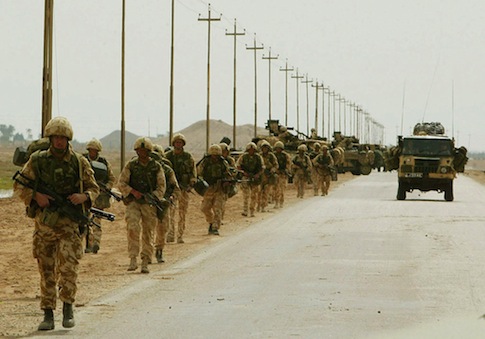Ten years after U.S.-led coalition forces began bombing Baghdad en route to overthrowing the Saddam Hussein regime, many of the war’s early supporters vigorously defend Operation Iraqi Freedom and say the region and the U.S. are safer because of it.
"No question," said former U.S. under secretary of defense for policy Eric S. Edelman. "The world is better off without Saddam Hussein."
"I totally think it was worth it," said Daniel Twining, a senior fellow for Asia at the German Marshall Fund and former State Department official under President George W. Bush. "People always forget that what we were trying to do was [end] the threat of Saddam Hussein. … We did that."
"This was a rogue regime that possessed very bad weapons. Unquestioningly, the region is better off," Twining added. "Iraq is not a threat to its neighbors and it’s not a threat to the United States."
While a number of the war’s prominent supporters have criticized facets of postwar strategy, they also defend the decision to intervene and remove Saddam Hussein from power. In the days leading up to the 10-year mark, former chairman of the Defense Policy Board Richard Perle, former CIA director James Woolsey, former Vice President Dick Cheney, and former deputy Pentagon chief Paul Wolfowitz have reiterated their support for the intervention.
Public opinion remains divided on the war. A Pew Research poll released Monday showed 41 percent of Americans say using force in Iraq was the right decision, while 44 percent disagree. Forty-six percent say the United States has succeeded in achieving its goals in Iraq while 43 percent believe it failed.
Some say the Bush administration’s failure to respond aggressively to criticism of the war allowed public misconceptions about it to fester.
"The Bush administration essentially stopped arguing the case [for Iraq] after they won reelection in 2004," said Peter Feaver, a former National Security Council special adviser under Bush. "Inside the administration, this was denigrated as ‘re-litigating the past.’"
Feaver, who said he disagreed with some of the administration’s early policy decisions on Iraq but supported U.S. military victory once the intervention began, said the administration’s communications failures allowed conspiracy theories about Iraq to proliferate.
These conspiracy theories, popularized by the left and the noninterventionist right, included the notion that the war was fought for oil, that it was fought on behalf of Israel, and that the Bush administration intentionally misled the public about the existence of weapons of mass destruction.
"Pleading nolo contendere in the public eye makes it look like you’re pleading guilty," said Feaver. "That allowed myths to entrench."
One of the most enduring myths of the war was that it was the child of a shadowy cabal of neoconservatives inspired by a deceased University of Chicago philosophy professor. Critics of the war say its early strategy failures discredit neoconservative positions on nation-building and democracy-promotion and confirm the wisdom of realist strategies of containment and deterrence.
"There is no question that the Iraq war's mismanagement made the ‘neocon’ label toxic at least [for] a while—‘neocon’ came to be defined as ‘mindless militarist fanatic,’" said Max Boot, a senior fellow at the Council on Foreign Relations and an early supporter of the Iraq intervention.
"This was deeply unfair insofar as none of the principals who actually managed the war effort—President Bush, Secretary of Defense Donald Rumsfeld, CentCom commanders Tommy Frank and John Abizaid, Amb. Jerry Bremer, military commanders Gens. Ricardo Sanchez, and George Casey—was actually a neocon," Boot said.
"Opinion began to shift, however, with the success of the ‘surge,’ another undertaking seen rightly or wrong as a ‘neocon’ project," said Boot. "As time has gone by and tempers have cooled, the ‘neocon’ label has lost much of its toxicity (if also much of its meaning). It has been overtaken by the new liberal bête noire: the Tea Party."
Feaver noted that neoconservatives opposed many of the failed policies in Iraq.
"The neocon position in terms of domestic public opinion is not as strong as it would have been if Iraq had gone a very different way," said Feaver. "However I wouldn’t say that every neocon argument is discredited for all time because of what happened in Iraq. What you’re seeing right now in Syria is that some of the problems that arose in Iraq through action are arising in Syria through inaction."
"This was an important part of the neocon argument: that ‘Doing nothing isn’t going to avoid these problems, so we might as well grasp the nettle,’" Feaver added.
Still, defenders of Operation Iraqi Freedom say the long-term legacy of the war is difficult to judge at this point.
"Much depends on events outside our control—namely how well Maliki and other Iraqi leaders do at managing their country," said Boot. "Given their dismal track record since the departure of American troops it is hard to be optimistic about the prospects for Iraq."
"Wars looked very different over time. Ten years after Korea, the war looked like a disaster," Feaver said.
